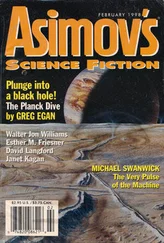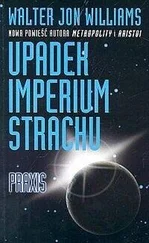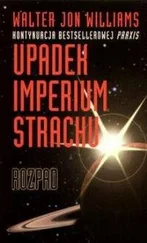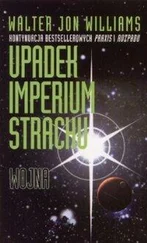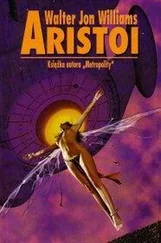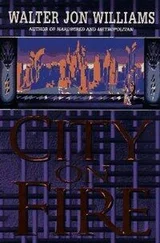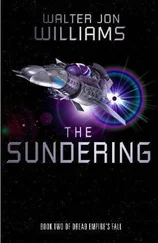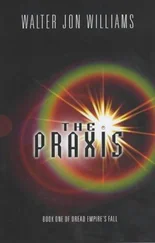Walter Williams - The Rift
Здесь есть возможность читать онлайн «Walter Williams - The Rift» весь текст электронной книги совершенно бесплатно (целиком полную версию без сокращений). В некоторых случаях можно слушать аудио, скачать через торрент в формате fb2 и присутствует краткое содержание. Год выпуска: 2013, Издательство: Baen Books, Жанр: Фантастика и фэнтези, на английском языке. Описание произведения, (предисловие) а так же отзывы посетителей доступны на портале библиотеки ЛибКат.
- Название:The Rift
- Автор:
- Издательство:Baen Books
- Жанр:
- Год:2013
- ISBN:нет данных
- Рейтинг книги:3 / 5. Голосов: 1
-
Избранное:Добавить в избранное
- Отзывы:
-
Ваша оценка:
- 60
- 1
- 2
- 3
- 4
- 5
The Rift: краткое содержание, описание и аннотация
Предлагаем к чтению аннотацию, описание, краткое содержание или предисловие (зависит от того, что написал сам автор книги «The Rift»). Если вы не нашли необходимую информацию о книге — напишите в комментариях, мы постараемся отыскать её.
The Rift — читать онлайн бесплатно полную книгу (весь текст) целиком
Ниже представлен текст книги, разбитый по страницам. Система сохранения места последней прочитанной страницы, позволяет с удобством читать онлайн бесплатно книгу «The Rift», без необходимости каждый раз заново искать на чём Вы остановились. Поставьте закладку, и сможете в любой момент перейти на страницу, на которой закончили чтение.
Интервал:
Закладка:
The only real sour note came later, when the pastor of the Lutheran Church of the Good Shepherd, Pete Swenson, turned up to rent a video. He crossed the parking lot slowly, a thoughtful frown on his beefy Swedish face, hands in the pockets of his chinos. He nodded at Frankland and Garb, walked into Bear State Videoramics, and could be seen having a long conversation with Magnusson.
Hilkiah approached, clenching his tattooed fists.
“G-” he began, then corrected himself. “Dad-blame that squarehead, anyway.”
“I can’t figure him out,” said Calhoun.
A good third of the inhabitants of the community were the descendants of a colony of Swedish and Norwegian immigrants that had been planted here in the 1880s. A great many of the members of the commercial class, such as it was, bore Swedish names. The lofty red brick Church of the Good Shepherd, sitting next to the immaculate green lawn of the immigrant cemetery, was the largest of the area’s churches, and the oldest.
And the Swedes’ attitude was different. It just was, and Frankland didn’t understand it. Why Swenson wouldn’t stand with the community against pornography, why he didn’t participate in the Love Offering Picnic, why he didn’t urge his flock to join the Christian Gun Club with their children- why wouldn’t a minister do these obvious things, which were so clearly a part of his duty?
Swenson left the video store and nodded at Frankland again as he shambled toward his car. There was a tape of Spartacus in his hand.
“Well,” Frankland said finally, as Swenson drove away. “Those Lutherans, they’re pretty close to being Catholics, you know.”
Calhoun and Hilkiah looked at him and nodded.
That probably explained it.
*
The stock market was going mad, the President thought, and all because Sam made a weird face on television. Some days he just loved his job.
“We need a full-court press on this issue,” he said. “Point out that the market is bearing out what the Administration has said all along.”
“Yes, sir,” said Stan Burdett. His spectacles glittered. He knew just how to handle something like this.
“Maybe the First Lady can say something in her speech in Atlanta tonight.”
“I’ll talk to Mrs. Grayson about it.”
There was the sound of a door opening. “Mr. President.” The President’s secretary entered the Oval Office- without knocking, the first time ever. “Something’s just happened.” There was a stricken look on her face.
The President saw the look and felt his heart turn over. For a moment he pictured the First Lady in a plane crash, his children in the sights of assassins …
“What is it?” he said, and tried to control the tremor that had risen in his voice.
“I called Judge Chivington’s office to make your golf appointment for next week.” His secretary’s lip trembled. “The judge is dead, sir. He passed away in his office about ten minutes ago. The paramedics are still there, but they say they can’t revive him.”
The President began to breathe again. Relief warred with sorrow in his mind, and then with shame at his being glad it was the judge and not his family.
“I thought the judge would bury us all,” he said, and then his voice tripped over the sudden ache in his throat.
Judge Chivington gone. The judge had been such a constant in the President’s life, from the very beginning of his career to the present, that he had truly never pictured his life without the man.
He looked at his secretary, then at Stan. “Could you leave me alone for a while, please?” he managed.
“Yes, sir,” Stan said.
The others left in silence. The President turned his chair to the tall windows behind him, to the roses ranked in the garden beyond.
It was like losing a father, he thought.
Judge Chivington had been one of the greats. Legislator, jurist, advisor to the powerful. One of the few things that the President could absolutely rely on throughout his life.
The President would see that the judge was properly recognized as he began his trip to the beyond. A funeral in the National Cathedral, a procession of Washington’s great orators from the pulpit, a choir that spat holy fire.
The judge’s wife had died about five years ago. The President would have to call the judge’s daughter, who was a high-powered lawyer on the West Coast.
Do this right, he thought. If you ever do anything right in your life, do this.
He turned and reached for the phone.
SEVEN
The two last being mechanics, and up late, mentioned that they were much alarmed at about 11 o’clock last night, by a great rumbling, as they thought, in the earth, attended with several flashes of lightning, which so lighted the house, that they could have picked up the smallest pin — one mentioned, that the rumbling and the light was accompanied by a noise like that produced by throwing a hot iron into snow, only very loud and terrific, so much so, that he was fearful to go out to look what it was, for he never once thought of an earthquake. I have thrown together the above particulars, supposing an extract may meet with corroborating accounts, and afford some satisfaction to your readers.
Extract of a letter dated West River, January 23,1812Omar gave himself Monday off and drove to Vicksburg to pick up Micah Knox, the speaker from the Crusaders National of the Tabernacle of Christ, who was supposed to meet him at the bus station. There was only one white man in the station when Omar arrived, a skinny kid slumped in a plastic waiting room chair with his feet propped on an army surplus duffel bag, and he seemed so unlikely to be a Crusader that Omar’s gaze passed over him twice before the kid stood up, hitched the duffel onto his shoulder, and walked straight up to him.
“Sheriff Paxton.”
His voice was nasal and unpleasantly Yankee. He was thin and very small, coming maybe up to Omar’s clavicle, and thin, with red hair cut short enough to show the odd contours of his skull. He wore a long-sleeved flannel shirt, black jeans, and worn work boots. He looked maybe all of seventeen years old.
“Micah Knox?” Omar shook the kid’s hand. With the duffel and the short haircut, he looked like a teenage soldier on leave.
“Thanks for coming to meet me,” Knox said. His eyes were eerie, with bayou-green pupils entirely surrounded by eye-white.
“Can I help you with that?” indicating the duffel.
“No, I got it. Thanks.”
They walked out of the waiting room into the blazing heat. Omar opened the trunk of his car and let Knox put his duffel inside. The duffel seemed surprisingly heavy. Sweat was already popping out on Knox’s forehead.
“Damn, it’s hot down here,” he said.
“You’re not exactly dressed for the South,” Omar said. Knox looked self-consciously at his long-sleeved flannel shirt.
“I got Aryan tattoos,” Knox said. “I don’t want the niggers to see them. Nothing but niggers on that bus.” Omar unlocked his car doors and he and Knox got inside.
Omar started the car, and for Knox’s benefit turned on the air conditioner full blast. Two young black men, leaning against the shaded wall of the station, looked at them both with expressionless faces. Probably they recognized Omar from television. Knox glared sullenly back at them.
“I hate the way they stare,” he said.
“You had a chance to eat? You want to stop somewhere?”
Knox shifted uneasily in his seat. “I don’t eat much.”
It occurred to Omar that maybe Knox didn’t have any money. “I’m buying,” he said.
“I’m not hungry,” Knox said. “But you go ahead and eat if you want.”
Omar drove in silence over the crumbling Vicksburg streets until he got onto I-20 heading west. The freeway vaulted off the Vicksburg bluff and was suddenly over water. Omar looked down at a huge gambling casino dressed up as a nineteenth-century riverboat, with huge flowering stacks and gingerbread balconies, then saw Knox sitting with his hands clamped on the passenger seat, his eyes closed and his face gone pale.
Читать дальшеИнтервал:
Закладка:
Похожие книги на «The Rift»
Представляем Вашему вниманию похожие книги на «The Rift» списком для выбора. Мы отобрали схожую по названию и смыслу литературу в надежде предоставить читателям больше вариантов отыскать новые, интересные, ещё непрочитанные произведения.
Обсуждение, отзывы о книге «The Rift» и просто собственные мнения читателей. Оставьте ваши комментарии, напишите, что Вы думаете о произведении, его смысле или главных героях. Укажите что конкретно понравилось, а что нет, и почему Вы так считаете.

